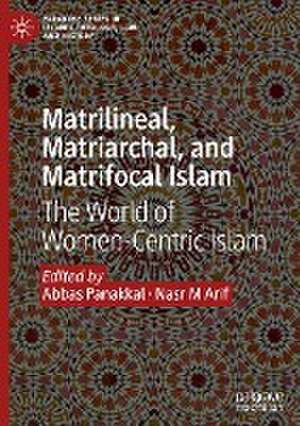Matrilineal, Matriarchal, and Matrifocal Islam: The World of Women-Centric Islam: Palgrave Series in Islamic Theology, Law, and History
Editat de Abbas Panakkal, Nasr M Arifen Limba Engleză Hardback – 25 feb 2024
Preț: 786.18 lei
Preț vechi: 958.76 lei
-18% Nou
Puncte Express: 1179
Preț estimativ în valută:
150.47€ • 155.07$ • 127.04£
150.47€ • 155.07$ • 127.04£
Carte tipărită la comandă
Livrare economică 03-17 martie
Preluare comenzi: 021 569.72.76
Specificații
ISBN-13: 9783031517488
ISBN-10: 3031517482
Pagini: 319
Ilustrații: XXIV, 319 p. 1 illus.
Dimensiuni: 148 x 210 mm
Greutate: 0.56 kg
Ediția:2024
Editura: Springer Nature Switzerland
Colecția Palgrave Macmillan
Seria Palgrave Series in Islamic Theology, Law, and History
Locul publicării:Cham, Switzerland
ISBN-10: 3031517482
Pagini: 319
Ilustrații: XXIV, 319 p. 1 illus.
Dimensiuni: 148 x 210 mm
Greutate: 0.56 kg
Ediția:2024
Editura: Springer Nature Switzerland
Colecția Palgrave Macmillan
Seria Palgrave Series in Islamic Theology, Law, and History
Locul publicării:Cham, Switzerland
Cuprins
Part I South and Southeast Asia.- Matrifocal, Matrilineal, or Matriarchal? Cultural Resilience and Vulnerability Among the Matrilineal and Muslim Minangkabau in Indonesia.- Adat Perpatih in Malaysia: Nature, History, Practice, and Contemporary Issues.- Cultural and Social Integrations in Matrilineal, Matriarchal, Matrifocal Muslim Communities of South India.- Part II Northeast Asia.- Affective Matrivocality and Women’s Voices: A History of Muslim Women Writers in China.- Matriarchal Family Structure in Korea’s Jeju Island and its
Implications for the Muslim Community in Korea.- The Maternal Initiative Role in the Japanese Muslim Community: Japanese Muslim Wives as Mediators Between Muslim Immigrants and Japanese Society.- Part III Africa.- Muslim Family Under Portuguese Rule: Sharı ̄ʿa and Matrilineal Custom in Colonial Coastal Northern Mozambique (ca. 1900–1974).- Asante Nkramo and Fantse Nkramo: Unravelling the Paradox
of Islam and Matriliny in Ghana.- Part IV Andalusia and Americas.- The Tuareg, from Arabia to Americas.- The Origins of Andalusian Muslim Matrilineal Systems.
Notă biografică
Abbas Panakkal, The School of History, University of St Andrews, United Kingdom.
Nasr M Arif, Visiting Professor, University of St Andrews, UK and Professor of political science, University of Cairo, Egypt.
Nasr M Arif, Visiting Professor, University of St Andrews, UK and Professor of political science, University of Cairo, Egypt.
Textul de pe ultima copertă
Around the world, Islamic cultures have developed distinctive matrilineal, matrifocal, matrilocal, or matriarchal natures as a result of how they have been practised by integrated and indigenised Muslim communities. In matrilineal descent systems, in contrast to the more common mosaic of patrilineal patterns, children belong to the mother’s ancestry group. Matrilineal Muslims therefore follow a social system in which people are identified with their mother's lineage, and the inheritance of property as well as succession are transferred through the matriline. This volume focuses on matrilineal, matrifocal and matriarchal Muslims and their unique folk natures, integrated social structures, adopted legal systems, and so on. It provides a unique perspective for understanding global Muslim communities that have succeeded in integrating the matrilineal tenets of local practices with religion, adhering to essential Islamic values in a way that makes traditional women-centred cultures acceptable to mainstream Islam.
Abbas Panakkal, The School of History, University of St Andrews, United Kingdom.
Nasr M Arif, Visiting Professor, University of St Andrews, UK and Professor of political science, University of Cairo, Egypt.
Nasr M Arif, Visiting Professor, University of St Andrews, UK and Professor of political science, University of Cairo, Egypt.
Caracteristici
Discusses various Islamic matrilineal and matriarchal communities Highlights diverse cultural scenarios connected with distinctive social practices Provides a unique perspective on understanding Muslim communities










